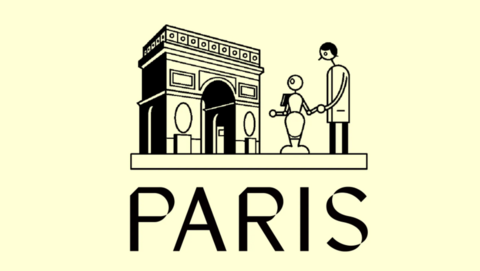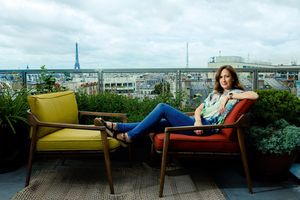T.I.C. - Informatique
The hottest startups in Paris

In 2020, Paris replaced Berlin in second place for European startup investment
London remains the undisputed heavyweight of the European startup ecosystem, but in 2020 Paris replaced Berlin in second place, attracting $3.4bn in investment (London accounted for $10.5bn of venture capital). Paris’s rise is rooted in government strategy – the introduction of a tech visa; the establishment of a public investment bank; changes in tax codes – as well as a series of seasoned founders reinvesting in the ecosystem; a generation of highly-educated students from the grand ecoles choosing not to go into private industry but start their own business; and grand projects such as Station F, Europe’s biggest startup incubator, which has attracted global talent.
“When I was appointed, President Macron decided that France needed 25 unicorns by 2025 – at that point we had three,” says Kat Borlongan, director of La French Tech, the government-supported agency that oversees national startup strategy. “We see it as a pipeline and the goal is to build the biggest possible talent pool by having the most open tech visa in the world and to lower the barrier to entrepreneurship.”
The government spends €1.3 billion in seed and pre-seed funding and “after that it's a velocity game,” Borlongan says. “The goal is to get from pre-seed to seed, from seed to A, to B, to C, to D all the way to the top.” There are now 120 companies that have passed through this process and each has an account manager at La French Tech who connects each business with government. “Every single ministry, government agency or administration has a touch point with startups,” Borlongan says.

Nicolas Julia, co-founder of NFT trading game Sorare
JULIEN FAURE
Alan
The French healthcare system has been rated by the WHO as among the best in the world. A mix of public and private, its bureaucracy can be complex, though.
“Healthcare is expensive, complex to navigate and unadapted to our individual needs. It relies on a one size fits all system, built to be reactive, when what we really need today is prevention,” says Jean-Charles Samuelian-Werve, who cofounded Alan with Charles Gorintin in 2016. “Alan’s mission is to help people access personalised, proactive, instant and accurate healthcare at the best possible price.”
Like other healthcare apps, such London’s Babylon Health, Stockholm’s Kry and Berlin’s Ada, it offers users access to services such as online consultations and symptom checking, while also managing back-end paperwork and post-care services. The startup currently has 176,000 members covered through 9,400 companies and annualised revenues of €110 million. Samuelian says that he expects to reach 200,000 users by the end of 2021 and to reach one million by 2023. In April, Alan raised series D funding of €185 million at a valuation of €1.4 billion.
“In a post-pandemic world, our role will be to re-engage individuals with the healthcare system,” Samuelian says. “For us, this means being personalised and tailored to each person’s needs, being able to offer the best price possible and relieving financial stress, being incredibly fast at delivering accurate answers on health and wellbeing, and being proactive when providing decisive medical guidance to everyone.
Earlier this year, Alan released a new mental health feature for insured members, offering unlimited access to psychological support, and also Alan Baby, a standalone free app available to anyone, whether they are insured by Alan or not, that offers parents specialised coaching to help them improve their baby’s sleep and offer advice on developmental milestones and via access to doctors and midwives. alan.com
Ankorstore
If you’re an independent retailer – either online or bricks and mortar – you need to find inventory: eco-friendly shower products in vintage bottles, organic cotton baby swings or artisanal Breton cookies. Ankorstore, which was founded in 2019 by Mathieu Alengrin, Nicolas Cohen, Nicolas d'Audiffret and Pierre Louis Lacoste acts as a marketplace, connecting 6,000 brands to 65,000 retailers. “Ankorstore levels the playing field for independent retailers by reducing the cost and time required to sell their products. We believe independent brands are the future of retail and want to drive economic growth by unlocking their potential,” says Lacoste.
The online marketplace, which has just raised a series B round of $100m – the largest for a Parisian startup in 2021 at the time of publication – led by Tiger Global and Bain Capital Ventures, is opening local offices across Europe, including Berlin, Amsterdam, London and Stockholm. “We want to live in a world where independent stores continue to line the streets of our cities and are glad that we can provide the supplier network and financial control these businesses need to succeed,” Lacoste says. ankorstore.com
Sorare
Schoolchildren throughout the world have long traded Panini stickers during major football tournaments. The challenge was finding the rarest ones to complete the collection. Sorare has moved the collectibles market online using blockchain technology – supply of rare “cards” is done by making them NFTs, which fans can trade as part of a fantasy football experience.“Our mission is to build ‘the game within the game’ and to give fans the platform to celebrate, share and own their football passion,” says cofounder Nicolas Julia.
Sorare currently has 140 partnering clubs – including Real Madrid, Juventus, Paris Saint Germain and Liverpool – as well as the German and French football associations and recently announced a partnership that will enable it to scale on Ethereum with an aim of facilitating more than $200m of trading card volume over the course of 2021. “Our ambition is to build the open platform for football digital collectibles,” Julia says. “We’ll fuel an ecosystem of games around Sorare cards, where anyone can build a game or a third-party application on top.” sorare.com
Pennylane
Founded by Alexandre Roquoplo, Arthur Waller, Edouard Mascré, Félix Blossier, Quentin de Metz, Tancrède Besnard and Thierry Déo in January 2020, Pennylane is a back-office platform that offers full-stack financial management. Accountancy is an automatable function, and Pennylane provides a real-time dashboard utilising clients’ full financial data sets. In January 2021, it raised a series A round from Partech, Kima Ventures and Global Founders Capital, taking its total funding to €19m. pennylane.tech
Resilience
While there has been significant progress in methods of treatment and therapeutics in cancer care, not all practitioners are aware of the latest research. Resilience wants to make practitioners aware of new ways of treating patients and to educate patients about their treatment in order to improve quality of life. Co-CEOs Céline Lazorthes and Jonathan Benhamou have raised $6m from some notable founders and investors in the French startup ecosystem. resilience.care

Celine Lazorthes, co-CEO of Resilience, a digital oncology startup
JULIEN FAURE
Strapi
“Headless” might sound like an aristocrat in eighteenth century France, but it’s also a buzzword in tech that describes architecture that separates the front-end and back-end. The two parts communicate through an API, which effectively means the front-end is platform agnostic and can be used on a variety of devices. Strapi’s clients such as Walmart, Toyota and Nasa use the startup’s content delivery structure which, it says, creates rich, consumer experiences on multiple devices. strapi.io
Sunday
The payments space is competitive, but Sunday – a fintech founded in 2020 by Victor Lugger, Tigrane Seydoux and Christine de Wendel – has found a niche by focusing on restaurants, and raised $24 million in a seed round in April 2021. Users scan QR codes for menus and to make payments, speeding up the process, making it contactless and helping restaurants by increasing the turnover of tables. sundayapp.com
Meero
Founded in 2016 by entrepreneur Thomas Rebaud, Meero is a marketplace that brings together photographers and clients, matching them for commercial projects and handling the creative, production and invoicing. With 31,000 clients, including L’Oréal, Uber and Sotheby’s, Meero automates back-end processes, such as retouching and grading, and claims to deliver a photoshoot every 25 seconds. meero.com
Back Market
Sustainability is increasingly a factor in purchasing decisions and consumer behaviour. Back Market is a marketplace for refurbished electronics offering devices at varying price points. The startup, which has five million customers, closed a series D round of $335m in May 2021 aims to expand to the US and make previously owned products the first choice for consumers. backmarket.co.uk
Ynsect
Raising a series C round of $372m in October 2020, Ynsect aims to tackle the resource-intensive production of animal feed, by building the world’s largest insect farm in Amiens in northern France. Producing mealworms that can be used in animal feed, fertilizer and pet food, the startup aims to produce protein in a sustainable manner and is now the most highly funded agtech business outside the US. ynsect.com
Source